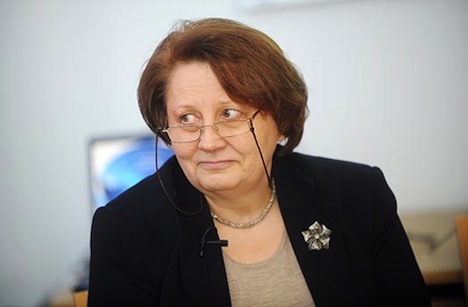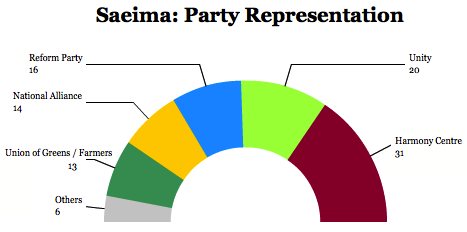On January 1, when Latvia celebrated its accession to the eurozone as the 18th member to embrace the single currency, it should have been a moment for Latvian prime minister Valdis Dombrovskis to celebrate shepherding his country into the core of Europe just barely two decades after its independence from the Soviet Union.![]()
Instead, Dombrovskis was counting the last days of his truncated tenure after the collapse of a supermarket roof in a suburb of Riga, the Latvian capital, killed 54 people. Dombrovskis, the 42-year-old wunderkind economist, resigned as prime minister shortly after the tragedy, calling for an independent commission to investigate the incident and arguing that Latvia needed a new government in the wake of the accident.
Though it may have been an act of political integrity, Dombrovskis’s resignation came at a nadir for his shaky minority. His party, the center-right Vienotība (Unity), placed third in local elections in June 2013, and disapproval was running high for his government, a coalition that also includes the more stridently right-wing Nacionālā apvienība (National Alliance) and the center-right Reformu partija (Reform Party).
Unity’s decision to nominate Laimdota Straujuma, the current agriculture minister, as its designate for prime minister is designed in part to boost the party’s chances at winning elections expected in October of this year.
The three parties that supported the Dombrovskis have indicated they will back Straujuma, and a fourth, Zaļo un Zemnieku savienība (ZZS, Union of Greens and Farmers), a union of Latvia’s green party and its agrarian party, will join them, along with three additional independent lawmakers. That support will give Straujuma an immediate boost — while the previous coalition controlled just 50 seats in the 100-member Saeima, Latvia’s parliament, Straujuma’s government will command a 16-seat majority:
That means that when Latvian president Andris Bērziņš formally nominated Straujuma as prime minister, it all but assured that she will command a majority to become the country’s first female prime minister.
So who is Straujuma? And what challenges does she face in the months ahead?
Dombrovskis came to power in 2009 facing a contraction that amounted to 18% of Latvia’s GDP, and he’s presided over Latvia’s resurgence. Latvia has achieved some of the highest GDP growth in Europe — 5.6% in 2012 and an estimated 4% in 2013. That growth has come even while Dombrovskis implemented budget cuts to bring Latvia’s debt to one of the lowest levels in all of Europe and forced upon Latvia a sharp internal devaluation — the kinds of wage cuts that have allowed Latvia to become more competitive. Even his push to join the eurozone was controversial, with nearly half the country opposing the move as recently as a month ago, notwithstanding the fact that the previous currency, the lats, was already tied to the euro.
Though it’s hard to miss the resemblance to German chancellor Angela Merkel, Straujuma comes to power as a former civil servant, and there’s no way to know if she’ll last nine months as head of government, let alone nine years. As agriculture minister, she participated often in negotiations at the EU level over the Common Agricultural Policy, which affects Latvian farmers, and she developed a reputation as a tough advocate for Latvia. But she’ll lead a party that’s massively unpopular and a government that she says will follow roughly the same course:
… the new government must not destroy the state budget for this year, [Straujuma] told reporters last night, reports LETA.The next government will have to ensure stability, stressed Straujuma. One of the key priorities, that is “of major importance for businessmen and society”, is preparing a program on absorption of European Union funds for Latvia. The European Commission should approve the program by mid-2014 so absorption of the funds could begin in the second half of the year, emphasized Straujuma.
Unity’s Andris Vilks is almost certain to continue as finance minister in the new government, and Reform’s Rihards Kozlovskis and Edgars Rinkēvičs will remains interior minister and foreign minister, respectively. Jānis Dūklavs, a member of the Union of Greens and Farmers, will replace Straujuma as minister of agriculture, a role that he held between 2009 and 2011 in the first two Dombrovskis governments. Raimonds Vējonis, a former environment minister, will become Straujuma’s new defense minister. Continue reading Who is Laimdota Straujuma? Latvia’s likely first female prime minister.

